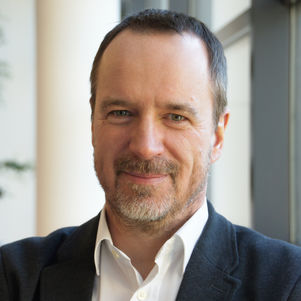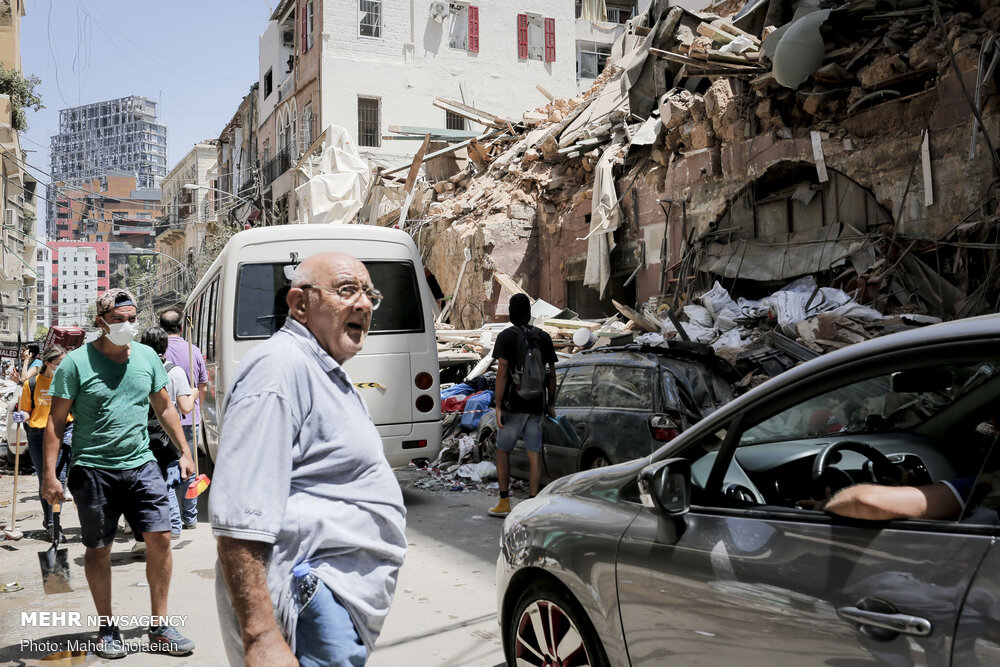The explosion was huge and Beirut was already dealing with several disasters. Emergency Response Professor Bartel Van de Walle explains how ICT can both help and disrupt.
'The explosion was a disaster on top of a number of others' (Foto: Mehdi Shojaeian / Mehr Newsz)
The explosion in Beirut on 4 August could be heard and felt on Cyprus, some 240 kilometres away. A week after the disaster, the ‘NRC’ newspaper wrote: ‘Lebanese researchers now suspect that a fireworks store near the flammable mountains of powdered chemicals in Hangar 12 caused the explosion whose shock wave razed buildings to the ground and blew out windows all over the city. At least 158 people died, more than 5,000 were injured and some 300,000 became homeless. The blow was so severe that the seismic waves corresponded to a 3.3 earthquake on the Richter scale.
 Prof. Bartel Van de Walle (Photo: TU Delft)
Prof. Bartel Van de Walle (Photo: TU Delft)Professor Bartel Van de Walle (Faculty TPM) is conducting research into the role of data and ICT in disaster relief. He sees not only the explosion, but also the context (a disaster upon disaster upon disaster), the mechanisms of start-up assistance, and the digital disruption against which there is no defence.
What did you think when you heard about the explosion in Beirut?
“I read it on Twitter quite soon after it happened, which is often the medium where you see this sort of thing appearing very quickly. I often see these messages quickly as I follow a lot of people working in emergency management and crisis response. When I saw the images of the explosion, it was clear that it would have major consequences. You could see the blast wave in some of those videos, and it was clear that there would probably be a lot of deaths and a lot of damage to the surrounding area. Especially given the location of the explosion, namely the harbour of Beirut, you could immediately see that this would have major consequences. Those were my first thoughts.”
I read that about 300,000 people have become homeless.
“I know – it’s unbelievable. I went to Beirut once as part of the relief effort after the Syria crisis in which more than one million refugees ended up in Lebanon. At one point the Government stopped counting. Lebanon has a number of challenges. In addition to the refugee influx, it has a volatile political climate resulting in years of conflict and attacks. Moreover, like the rest of the world, they were also having to deal with corona. So the explosion was a disaster that came on top of an already very difficult context of conflict, political instability and then an epidemic. It was a ‘perfect storm’, you could say, with several disasters coming together.”
Most people then shake their heads and turn off the television. But what is most needed now?
“In the first instance, of course, is immediate assistance such as search and rescue. That means trying to get people out of the rubble. A lot of international search and rescue teams have been sent out, including from the Netherlands. It’s important that those teams get to the scene very quickly. You have to be there within 12 hours. Arriving much later makes little sense. The number of people you can still save decreases rapidly with passing time. Of course a lot of local people get victims out of the rubble. Most people are rescued by local residents and not by international teams. The international teams come in where it’s really difficult, where specific expertise or technological tools are needed. That’s step one.
After that there is the need for medical assistance, because a lot of people have been injured by flying glass and the pressure wave that destroyed everything. The hospitals were immediately flooded by people with a lot of injuries while the capacity of some of those hospitals had already been reached by corona patients. The explosion came on top of corona. The hospitals have the emergency medical teams, that’s the second phase, so to speak.
After that, what counts is everything that has to do with food. A lot of storage facilities were lost. Structural help is needed and it’s already starting up. The World Food Programme is already providing aid and nutrition. That will be the most important thing for the coming weeks and months. What makes it even more difficult is that people have had to move around because of the explosion. If they are carriers of Covid-19, they could also infect other people. This is an example of how complex assistance becomes in a world where there’s an epidemic.”
Not to even mention the reconstruction. Your expertise is ‘information management in crisis situations’. How can information management help here?
“The standard way in which ICT helps is by ensuring good coordination. Twelve international teams have gone there and they have to coordinate where they are going to work. The UN has a system where teams sign up to discuss the deployment. A coordination centre is always set up on site where the teams consult each other.
There is a second important role for ICT that we have seen happening more and more in recent years. Fake news spreads quickly on social media. For example, there are videos suggesting that it was a rocket attack. Or that there was no ammonium nitrate in the shed but something else. These kinds of rumours quickly spread. Then it is important that there is also a dissenting voice by experts. You can see that ICT can have a coordinating role via social media, which is of course what we want, but it could just as easily be disruptive. We’ve seen that more and more often in recent years.”
What defence is there against that disruption?
“Pretty little, to be honest. Rumours spread very quickly. They appeal to people, who then share them. As a dissenting voice, the only thing you can say is that the experts say something else. That’s why the UN has started an initiative in recent months called verification. That’s where they spread verified news. It remains a difficult exercise without a ready-made solution. At the TPM Faculty, two of my PhD students are researching fake news: Emma den Brok and Amir Fard.”
In your introductory speech you mentioned the Humanitarian Data Centre in The Hague. Does it still play a role in the aid campaigns in Beirut?
“Absolutely. We’re already seeing that. Its website contains updated assessments, as they’re called. You make an inventory of what is broken and what is needed to rebuild it. The Humanitarian Data Centre receives input from many aid organisations which it collects and publishes on its website. In that sense, it plays an important role. Not only in the disaster in Beirut, but all over the world.”
You said earlier that you will be going to the UN University in Maastricht on 1 September. What are you going to do there?
“I’m going to be Director of a UN University Institute. The UN University has about 12 institutes all over the world, one of which is in the Netherlands. That’s UNU-MERIT, which stands for Maastricht Economic Research Innovation & Technology. I’ve always tried to bridge the gap between science and the work of the United Nations. UNU-MERIT is the ideal institute to strengthen that connection. I hope I can continue to work with TU Delft because I see great opportunities for that.”
- The joint relief organisations have launched a relief operation for victims of the explosion in Beirut. Donations are spent on rescue work, medical care, drinking water, shelter and psychosocial care.
Do you have a question or comment about this article?
j.w.wassink@tudelft.nl


Comments are closed.